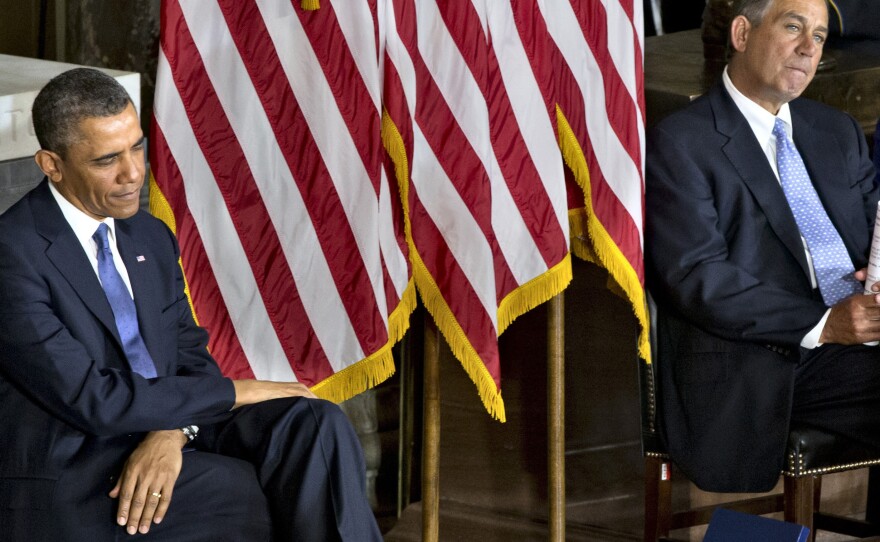
It is good to be the king.
That old adage holds, even though nowadays we call our chief executive "Mr. President."
After another long day of showdown over the shutdown, President Obama was able to dominate the headlines, break the tension and change the atmosphere in Washington. He could demonstrate everything that is different about being in the White House -- as opposed to that other House where Speaker John Boehner lives.
The president could do all this just by putting out the word that he was about to appoint the most powerful central banker in the world. Extra added kicker: The appointee would be the first woman in history to hold the job.
Nice way to flex 'em if you've got 'em.
The announcement that Janet Yellen would be tapped to move up from vice chair to chairwoman of the Federal Reserve was long awaited and, in recent weeks, all but certain. Still, Yellen's final ascent also symbolizes several things about this point in the Obama presidency that are important for the current standoff with House Republicans and Boehner, their titular leader.
First, it reminded the world that someone is in charge of something in Washington, and serving the continuity of the Federal Reserve and the American economy. This stands in contrast to the president's chief congressional antagonists, who are on TV saying it's not a problem if the United States runs out of borrowing authority and that default on U.S. debt is a scare tactic. (Boehner may not share either of those views, but given his situation he cannot denounce them, either.)
Second, the Yellen move demonstrated that Democrats are finally aware of the importance of unity and actually paying their dues to the club. Everyone knows Obama was intrigued with the idea of a different Fed nominee, his former Treasury Secretary Lawrence Summers. But the brilliant and abrasive Summers had long since alienated much of Obama's power base in Congress and in the country. Democratic women in the Senate in particular were opposed. This time, the president got the message. And let's be frank, right now he needs a united Democratic Party more than ever before.
(For the moment, at least, that unity is holding. Even Democratic senators facing re-election in red states next year are sticking with Majority Leader Harry Reid on difficult votes. The contrast could not be more potent, as Hill Republicans in both chambers are as riven with dissent and disarray on strategy and tactics as at any time in modern memory.)
Third, the Yellen move showed that the president can still use his powers of office and matchless media access to change the game. In recent days, many Republicans have begun to convince themselves that the drubbing they took in the government shutdown war of 1995-1996 was strictly a matter of then-President Bill Clinton's charm and media savvy.
Without taking anything away from "Slick Willie," that outcome 18 years ago had at least as much to do with the inherent powers of the presidency and the tunnel vision of House Republicans.
The Yellen news came at the end of a day of sharp distinctions between the champions of the two parties. The president had staged the longest news conference of his five years in office, well over an hour, fielding questions from as far away as Australia. Not long after, Speaker Boehner came to a microphone in the Capitol looking and sounding tired. He read a statement imploring the president to negotiate, briefly responded to three questions and abruptly walked away.
Boehner has never been one for news conference jousting. He raises his voice in such settings as if addressing a crowd gathered at a picnic. And in the present moment he has less reason than ever to take questions.
Boehner after all does not want to repeat his claim that the House lacks the votes to pass a funding resolution, as he did over the weekend. That assertion brought howls of disbelief from all those willing to count votes in both parties. And when he says his Republican caucus is standing on principle, it's not clear whether that principle has to do with debts and deficits or last-ditch resistance to the Affordable Care Act.
Few would doubt that for Boehner himself the Big Deal is fiscal. But he cannot cut loose the GOP contingent that would shut down government functions -- including the honoring of U.S. debt obligations -- rather than be seen as accepting "Obamacare."
If he were to isolate that contingent, as many Republicans urge, Boehner would make himself vulnerable to their ire. It could happen in a closed-door GOP meeting or out on the House floor, where breakaway Republicans might join their votes with those of the Democrats in order to remove the speaker in mid-session. That weapon hasn't been used in a century, but it's still there on the wall.
All this means that each day John Boehner wakes up as speaker could be his last. And that too poses a stark contrast with the man in the White House.
The standoff is not going to end soon. But it will end. And certain facts remain. If you hold the high cards, the game eventually comes to you.
Copyright 2013 NPR. To see more, visit www.npr.org.






